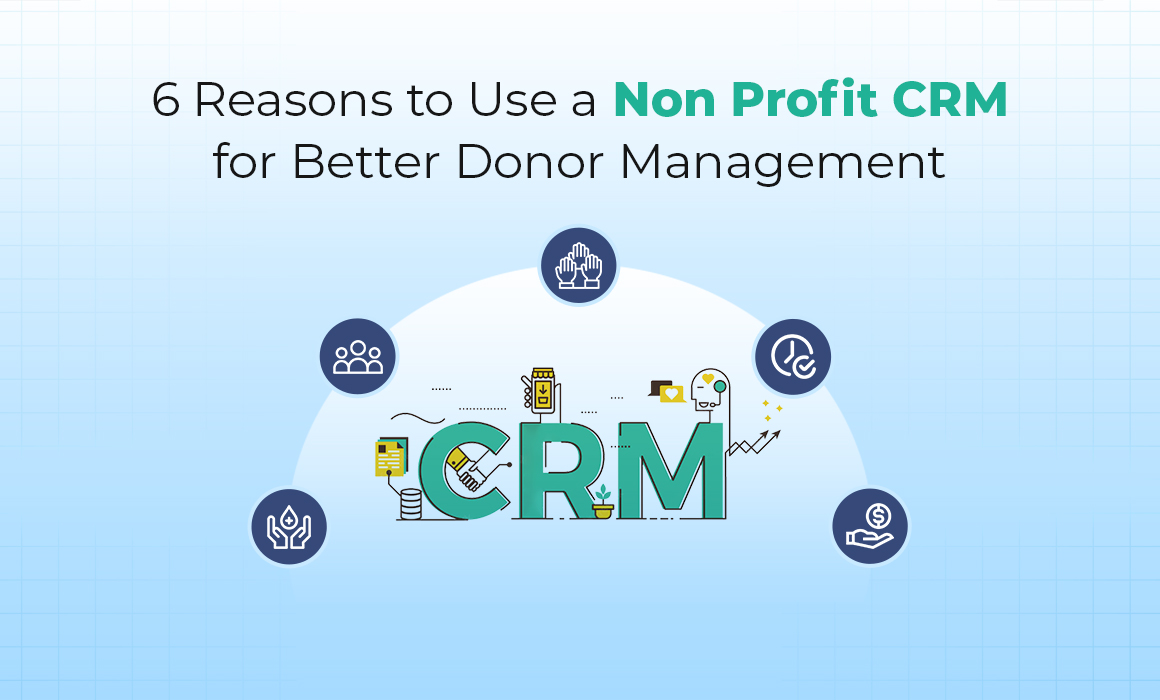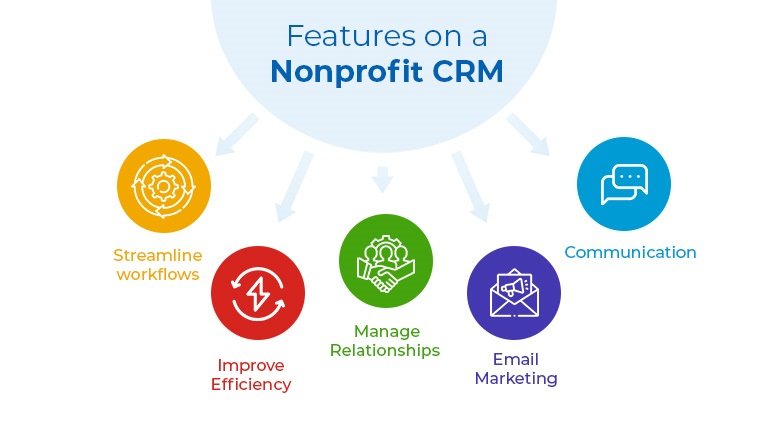
CRM for Non-Profit Organizations: Building Stronger Relationships and Driving Impact
Non-profit organizations operate with a unique mission: to make a positive difference in the world. Unlike for-profit businesses, their success isn’t measured in revenue but in the impact they create. To achieve this impact, non-profits rely heavily on building strong relationships with a diverse range of stakeholders, including donors, volunteers, beneficiaries, staff, and partners. This is where Customer Relationship Management (CRM) systems become invaluable.
While the term "customer" might seem out of place in the non-profit context, the principles of CRM are highly relevant. By adapting CRM strategies, non-profits can gain a deeper understanding of their constituents, personalize their interactions, and ultimately drive greater engagement and support for their cause.
What is CRM for Non-Profits?
At its core, CRM for non-profits is a technology-driven approach to managing and nurturing relationships with all the people who are connected to the organization. It involves using a centralized database to store information about each constituent, track their interactions, and analyze their behavior. This data can then be used to tailor communications, personalize fundraising appeals, and improve overall engagement.
Instead of "customers," non-profits deal with:
- Donors: Individuals or organizations that provide financial support.
- Volunteers: People who donate their time and skills to the organization.
- Beneficiaries: The individuals or communities that the non-profit serves.
- Staff: The employees who work for the organization.
- Partners: Other organizations that collaborate with the non-profit.
- Advocates: People who actively support the organization’s mission.
Key Benefits of CRM for Non-Profits
Implementing a CRM system can bring a wide range of benefits to non-profit organizations, including:
-
Improved Donor Management:
- Centralized Donor Data: A CRM provides a single source of truth for all donor information, including contact details, donation history, giving preferences, and communication preferences.
- Personalized Fundraising: By understanding each donor’s interests and motivations, non-profits can create targeted fundraising appeals that resonate with them on a personal level.
- Automated Donation Tracking: CRM systems can automate the process of tracking donations, sending thank-you notes, and generating reports.
- Enhanced Donor Retention: By nurturing relationships with donors and making them feel valued, non-profits can increase donor retention rates.
-
Streamlined Volunteer Management:
- Volunteer Database: A CRM can store information about volunteers, including their skills, interests, availability, and past volunteer experiences.
- Efficient Volunteer Recruitment: CRM systems can help non-profits identify and recruit volunteers who are a good fit for their organization.
- Volunteer Scheduling and Communication: CRM can streamline the process of scheduling volunteers, sending reminders, and communicating important information.
- Improved Volunteer Engagement: By providing volunteers with meaningful opportunities and recognizing their contributions, non-profits can increase volunteer engagement.
-
Enhanced Program Management:
- Beneficiary Tracking: A CRM can track information about beneficiaries, including their needs, services received, and outcomes.
- Program Evaluation: CRM data can be used to evaluate the effectiveness of programs and identify areas for improvement.
- Reporting and Compliance: CRM systems can generate reports that are required for funding applications and compliance purposes.
-
Better Communication and Collaboration:
- Centralized Communication History: A CRM stores all communications with constituents, including emails, phone calls, and meetings.
- Improved Internal Communication: CRM systems can facilitate communication and collaboration between different departments within the non-profit.
- Consistent Messaging: By using a CRM, non-profits can ensure that all communications are consistent with their brand and messaging.
-
Data-Driven Decision Making:
- Reporting and Analytics: CRM systems provide a range of reporting and analytics tools that can help non-profits understand their data and make better decisions.
- Identifying Trends: CRM data can be used to identify trends in donor behavior, volunteer engagement, and program outcomes.
- Measuring Impact: CRM can help non-profits measure the impact of their work and demonstrate their value to stakeholders.
Choosing the Right CRM for Your Non-Profit
Selecting the right CRM system is crucial for success. Here are some key factors to consider:
- Needs Assessment: Understand the specific needs of your organization. What are your biggest challenges in donor management, volunteer management, or program management?
- Budget: Determine how much you can afford to spend on a CRM system. There are many different options available, ranging from free to enterprise-level.
- Features: Consider the features that are most important to your organization. Do you need advanced reporting capabilities, integration with other systems, or mobile access?
- Ease of Use: Choose a CRM system that is easy for your staff to learn and use.
- Scalability: Ensure that the CRM system can scale to meet the growing needs of your organization.
- Support and Training: Check what kind of support and training is offered by the CRM vendor.
- Integration: Ensure that the CRM system can integrate with your existing systems, such as your accounting software, email marketing platform, and website.
- Security: Make sure that the CRM system is secure and protects the privacy of your constituents’ data.
Popular CRM Solutions for Non-Profits
There are many CRM solutions available that are specifically designed for non-profit organizations. Some popular options include:
- Salesforce Non-profit Cloud: A powerful and customizable CRM platform that offers a wide range of features.
- Blackbaud Raiser’s Edge NXT: A comprehensive CRM system that is designed for fundraising and donor management.
- Microsoft Dynamics 365 Non-profit Accelerator: A CRM solution that is built on the Microsoft Dynamics 365 platform.
- Bloomerang: A donor management software that is designed for small to medium-sized non-profits.
- Kindful: A CRM that is focused on donor engagement and communication.
Implementation Best Practices
Implementing a CRM system can be a complex process. Here are some best practices to follow:
- Develop a Clear Strategy: Define your goals for using CRM and develop a plan for how you will achieve them.
- Involve Stakeholders: Get input from all stakeholders, including staff, volunteers, and board members.
- Data Migration: Plan carefully for how you will migrate your existing data into the CRM system.
- Training: Provide adequate training to your staff on how to use the CRM system.
- Customization: Customize the CRM system to meet the specific needs of your organization.
- Ongoing Maintenance: Regularly maintain the CRM system to ensure that it is working properly.
The Future of CRM for Non-Profits
The future of CRM for non-profits is likely to be shaped by several trends, including:
- Artificial Intelligence (AI): AI is being used to automate tasks, personalize communications, and provide insights into constituent behavior.
- Mobile Technology: Mobile CRM apps are making it easier for staff and volunteers to access and update data from anywhere.
- Social Media Integration: CRM systems are integrating with social media platforms to track engagement and identify potential donors and volunteers.
- Data Security: With increasing concerns about data privacy, non-profits are investing in CRM systems that offer robust security features.
Conclusion
CRM is no longer a luxury for non-profits; it’s a necessity. By implementing a CRM system, non-profits can build stronger relationships with their constituents, improve their operations, and ultimately drive greater impact. The key is to choose the right CRM solution for your organization, implement it effectively, and use it to its full potential. When done right, CRM can be a powerful tool for helping non-profits achieve their missions and make a real difference in the world.

